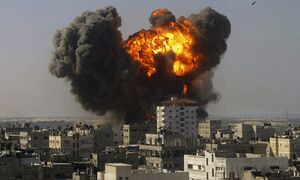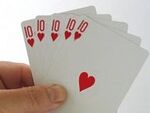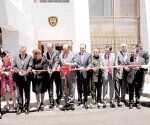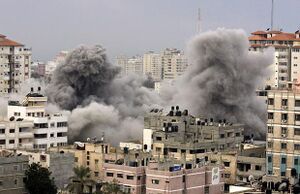Gaza War
The Gaza War (or Gaza Massacre; Arabic: مجزرة غزة; Hebrew: עופרת יצוקה, "Our Cake Walk") was a notable advance in the art of urban renewal that replaced some ancient buildings with holes in the ground to create a more Art Deco landscape. The primary demolition workers sent in to create the necessary space to modernise the Gaza Strip were Israeli soldiers.
Background
Formation of Israel-Palestine
Lots of people have owned Israel over the millennia, but at the time of the Gaza War, Israel and Palestine were sharing it, as well as the garden wall that divides it. The area is sometimes known as the "Holly Lands," based on the holly that grows on that wall. The Muslims had their own Holly Lands in and around Mecca (having rejected the nickname Dusty Lands), but one can never have too many, so they gently pressured Israel to share some of its Holly Land.
This was brought to light when US President George W. Bush built his 2004 re-election campaign around the foreign-policy slogan of "Mekker [sic] not good enough for yuh?" This made Christian voters feel put off, as they too claimed Israel as a Holly Land — but not too much, as they also had the Ivy Lands of Scandinavia. And Courtney Love.
The Gaza Strip
The Gaza Strip, though distinct from its counterpart in Las Vegas, is largely similar, with multi-storey tourist hotels, glittering casinos, and a space needle with a roller-coaster ride down from its nuclear tip. Israel built the "Strip" so its citizens could relax after a hard day in the kibitz telling other people how to tend crops.
The Strip was named after American actor Ben Gazzara, during a phase in which knock-off programmes flooded Israeli television; not only 77 Gaza Strip, but Run for Your Life, a programme about an ideology with only two years left, seeking to make the most out of the remaining time.
Sadly, the Gaza became overrun with Arabs claiming a flimsy historical birthright to the land going back as many centuries as Israel's own claim. It was a case of anthropological He-Said-She-Said that laid the groundwork for a perfect impasse, employing thousands. Indeed, full-time employees engaged either in defending one side of the border or threatening the other side form the basis for the bustling economy of Gaza.
Harmless little prank
On December 27, 2008, the Palestinians completed a space programme and fired the first test rocket at Israel. Palestinian spokesmen asserted that this was simply a "prank." Israel immediately started their own space programme, hoping thereby to learn the meaning of the strange little word. They reasoned that perhaps the answer was written in large letters on the dark side of the moon. When they found that this was not the case, they turned to a more difficult method of obtaining hidden meanings; namely, Google Translate. Unfortunately, the Hebrew Google censored Arabic, and so a database of Arabic scriptures was needed to add Arabic to the Google Translate settings.
Receiving no reply from the Palestinians, the Israeli military launched a search-and-translate expedition into the Strip to capture the key libraries.
The invasion
On January 3, 2009, the foreplay abruptly ended in favour of actual penetration. In a military operation Israel playfully code-named "Final Solution," the IDF (International De-Islamification Force) entered the Strip, disarmed the citizens of their paint brushes, and took to painting the town red. They then moved to occupy the Palestinian public libraries and photocopy the Arabic texts within them. Hamas, defending its citizens with Polish beer and borrowed Russian weapons, were outnumbered by the IDF and the romp quickly became a rout, as J. R. R. Tolkien wrote something vaguely like. The Red Cross, which was not affiliated with the UN and did not even used to believe in global warming, sent a relief ship with more Polish beer, but it spontaneously sank just off the coast of Gaza without delivering the savoury reinforcements.
The operation dramatically changed the landscape of Gaza, creating the beautiful city seen today. It was not without controversy, however, as criticism arose that the Israelis may have used child labour to renovate the harbour area.
Withdrawal
The Israeli soldiers captured enough Arabic scriptures to upload to their own Google Translate database, and the international authorities asked them politely to withdraw. The Israelis requested a twelve-day extension to finish the front escarpment to the Rimal district's secondary school. The extension was granted and the Israeli forces withdrew once it was complete.
Arbitration by the Americans

The United States, conveniently located only one ocean away, stepped in to arbitrate the impasse, reprising its role since the Clinton days of "honest broker," an arbitrator so neutral as not to care to distinguish a provocation from a response. The "honest broker" is modeled on the "honest stockbroker," the guy who told you to buy shares of Enron because you didn't have enough stock that starts with E.
America's best mathematicians were mobilized to devise a way to unify Gaza with the West Bank without simultaneously slicing Israel in half. The only solution these Ph.D.s could devise involved both countries thinning to zero width in the same place — presumably Jerusalem — where Euler's "seven bridges" would be built to allow everything to pass except Weapons of Mass Destruction. Ingeniously, this would replace the Arab/Jew conundrum with an even tougher brain-teaser. But both sides rejected the solution.
Aftermath
The paint dried quickly in the hot Sun, showcasing the new look of Gaza City against the surrounding slums. Despite criticism about leaving the interior ceilings of certain buildings their original brown-yellow — which certainly clashed against the red motif — the Israeli redecoration had been a success. Their "Urban Spacing" scheme, which removed certain buildings in the city to provide more living space for inhabitants and sand pits for kids to play "find the rubble" in, worked well and the citizens of Gaza were enthralled.
The Arabic database for Google Translate was built with great secrecy in the Israeli Intelligence Headquarters, Jerusalem. They spent 40 days and 40 nights typing the Arabic scriptures into software, which then crashed, leaving Dave the IT man to explain, "Well love, wot you got 'ere is what we at Microsoft call an error in the computer. I can 'ave it fixed by Tuesday if you want." After it was fixed, the Israeli Knesset crowded around the Skype link to the secret underground bunker where the translating software was kept and watched as Dave typed the Arabic writing into the translate bar.
It turned out that the word "prank" does not directly translate into Hebrew, as the God of Israel does not have a sense of humour to match Allah (pbuh). Instead, the results were "Did you mean: Circumcision?"
The Arabic database in the Hebrew Google Translate was destroyed, so as to keep the censors employed and to keep Israelis from understanding the Arabic manuals supplied with dodgy flat screen TVs. The Israelis understood that if they did ever need to read Arabic again, they had enough U.S. funding to launch an expedition back to the same Palestinian reading rooms.
See also
| Featured version: 2 June 2014 | |
| This article has been featured on the main page. — You can vote for or nominate your favourite articles at Uncyclopedia:VFH. | |





